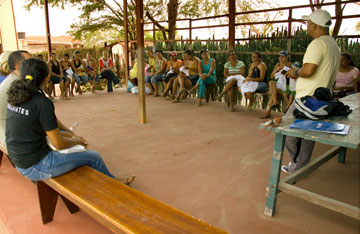Empowering communities to obtain a sustainable habitat -- Habitat for Humanity Int'l 1
Empowering communities to obtain a sustainable habitat
By Monica Ramirez
|
|

Claudio Barga (right), project coordinator for Varjada, Brazil, leads a community meeting. Habitat’s Latin America and Caribbean area office is expanding the community involvement concept to work with communities as a partner on projects that will achieve new development goals. ©Habitat for Humanity/Ezra Millstein.
|
|
|
|
Recently, several staff members in Habitat’s Latin America and the Caribbean area office spent time working with a volunteer construction team in Tejarsillos, a shanty town near the center of San José, Costa Rica.
Our task was to help the homeowner, Yahira, replace the shack where she was living with her six children with an improved house built of pre-fabricated panels. Although we felt satisfied with the task, we also realized what a drop in the bucket it was compared with the similar needs of 400 other families living in her community.
With the imminent risks they face — mudslides caused by heavy rain, health risks to children caused by a lack of adequate water and sanitation systems — the potential for community-level disaster was inescapably evident.
Habitat for Humanity is learning that the task of securing adequate housing with minimum quality standards requires that we go beyond home construction and become involved, when possible, with the so-called “social production” of housing — that is, the process by which communities resolve their own housing issues one step at a time to create more sustainable and integrated housing interventions.
There are examples of Habitat national organizations that become involved with the community in order to devise relevant housing interventions in addition to the house itself, such as providing support for securing land tenure, training families in construction techniques and financial education, and empowering communities to advocate for better sanitation conditions.
But only recently have we started to recognize and classify these “additional” interventions as housing support services. In Latin America and the Caribbean, Habitat is proposing to integrate and deliver housing support services within a systematic, community-based Habitat Management Cycle.
Housing support services transfer capacity to communities, project partners and volunteers by providing housing solutions and supporting the development of sustainable settlements. Such an approach allows additional partners and volunteers to get involved by supporting complementary non-construction community projects and services — both tangible and not tangible. This creates caring and relevant bonds between communities and across social and geographic boundaries.
In Latin America and the Caribbean, the Habitat Management Cycle is a process through which housing support services providers systematically engage with communities over extended periods. To deliver relevant support services, the process should begin with the national organization’s becoming familiar with the community’s existing efforts to improve their housing conditions and with the stakeholders involved in the process.
The first step is to approach community leaders and organizations to establish a relationship that opens the door to further, structured work with individual community members related to their needs. This requires a thorough process of gaining the trust and confidence of local stakeholders, assuring them Habitat is a legitimate housing expert and a socially committed organization. It requires dialogue and negotiation in order to establish a partnership in which both parties — Habitat and the community — have stated responsibilities.
The second step is to assess, in detail, the housing needs within the settlement, the socioeconomic situation of each family, and the shortcomings of the local housing market. This can be done through any of the available assessment tools from Habitat or others, such as the Vulnerabilities and Capacities Needs Assessment, or VCA, and the Emergency Market Mapping Assessment, or EMMA.
This needs assessment should be conducted in a participatory manner. The response strategy should be spelled out in an action plan developed in partnership with the community, incorporating the range of housing support services that will help the community overcome the obstacles preventing members from improving their housing conditions.
It means devising services, construction products and improvements tailored to the families’ needs and economic capacity, and facilitating those services over a period long enough to accompany families on their pathway to permanence. Within this model, Habitat will help the community connect with other partners to meet additional needs, and will channel resources from different sources to implement integrated housing solutions.
Throughout the implementation, housing support services should also contribute to building capacity in organization, management and the social production of housing in the community. Thus we will help to empower these communities to continue providing additional services and projects for themselves, which will continue to move more families toward a more sustainable and livable environment.
Such an approach requires Habitat to enter as a partner/collaborator with the community and other actors. In other words, we must renounce the need to own the process from “A to Z.” We will need to increase the skills, knowledge and capacity that will strengthen the services we provide to communities. In general, it is the families and communities who will establish priorities, while Habitat will act as a supporter and facilitator. This requires not only empowering communities to achieve sustainable and adequate housing, but also empowering each family and the community as a whole to set and achieve new developmental goals.
Although our activities are too new to illustrate long-term success, we are confident the housing support services can become the key transformational vehicle for Habitat in its mission to help families and communities resolve their housing issues. They add specific value to the services that we wish to deliver, according to the teachings of Jesus Christ, empowering people to achieve adequate housing and a nourishing environment for individual progress and collective development.
Monica Ramirez is director of housing and human settlements in Habitat for Humanity’s Latin America and Caribbean area office.